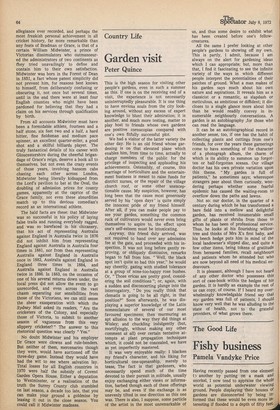Country Life
Garden visit
Peter Quince
This is the high season for visiting other people's gardens, even in such a summer as this. If one is on the receiving end of a visit, the experience is not necessarily uninterruptedly pleasurable. It is one thing to have envious souls from the city looking around, without any excess of expert knowledge to blunt their admiration; it is another, and much more testing, matter to play host to friends whose own gardens are positive cornucopias compared with one's own fitfully successful plot.
We had a visitor of the latter variety the other day. He is an old friend whose gardening is on that elevated plane which enables him, from time to time, actually to charge members of the public for the privilege of inspecting and applauding his achievements. Ostensibly, of course, this marriage of horticulture and the entertainment business is meant to raise funds for district nurses, or the repair of the village church roof, or some other unexceptionable cause. My suspicion, however, has long been that the cause most generously served by his 'open days' is quite simply the innocent pride of my friend himself. After all, if you can make people pay to see your garden, something the common ruck of cultivators would never even bring themselves to aspire to, the effect upon one's self-esteem must be intoxicating.
Anyway, this friend duly arrived, was not required to hand over any admission fee at the gate, and proceeded with his inspection. It was not long before gently reproving, or obliquely dismissive, remarks began to fall from him. "Well, the black spot isn't quite so bad this year," he would say cheerily, gazing with studied tolerance at a group of none-too-happy rose bushes. Or, "Those ericas are pretty good, considering the soil conditions "; or, again, with a sudden and disconcerting plunge into the interrogatory, "Do you really think that clematis is going to be all right, in that position?" Soon afterwards, he was displaying a superior knowledge of the Latin nomenclature of several of our most favoured specimens; then murmuring an apt allusion to the way they did things at Wisley; and chuckling indulgently (but, mortifyingly, without making any other comment at all) over certain tentative attempts at plant propagation techniques which, it could not be concealed, we have as yet imperfectly mastered. It was very enjoyable really: I blacken my friend's character, and his liking for horticultural one-upmanship, merely to tease, The fact is that gardeners, who necessarily spend much of the time devoted to their pursuit in solitude, usually enjoy exchanging either views or information, barbed though each of these offerings may be, and even if the exchange is as unevenly tilted in one direction as this one was. There is also, I suppose, some particle of the artist in the most unremarkable of us, and thus some desire to exhibit what has been created before one's fellowcreatures.
All the same I prefer looking at other people's gardens to showing off my own„ This is partly, I admit, because I am always on the alert for gardening ideas which I can appropriate; but, more than that, I find it fascinating to see the infinite variety of the ways in which different people interpret the potentialities of their patches of ground. What a man makes of his garden says much about his own nature and aspirations. It reveals him as a classicist or a romantic, as slapdash or meticulous, as ambitious or diffident; it discloses to a single glance more about him than he would readily convey in innumerable neighbourly conversations. A garden is an autobiography ,for those who can read the language.
It can be an autobiographical record in another sense, too, if one has the habit of collecting plants and cuttings from one's friends, for over the years these garnerings come to have something of the character of a photograph album, the charm of which is its ability to summon up forgotten or half-forgotten scenes. Our village doctor has his own private variation upon this theme. "My garden is full of patients," he sometimes says; whereupon strangers peer about them curiously, wondering perhaps whether some fearful epidemic has caused the waiting-room to overflow down the paths and lawns.
Not so: our doctor, in the quarter of a century during which he has transformed a bare field into a mellow and delightful garden, has received innumerable small gifts of plants or shrubs from those to whom he has been of professional service. Thus, he looks at his flourishing willowtree and thinks of Mrs X's first baby, and his beech hedge puts him in mind of the local landowner's slipped disc, and quite a few other items, being tokens of gratitude from bereaved families, recall neighbours and patients whom he attended but who are now beyond all need of his medical endeavours.
It is pleasant, although I have not heard of any other doctor who possesses this sort of case-book within the hedges of his garden. It is hardly an example the rest of us can copy, of course. If I heard my over whelmingly knowledgable friend say that my garden was full of patients, I should know very well that he was alluding to the state of health, not to the grateful providers, of what grows there.










































 Previous page
Previous page